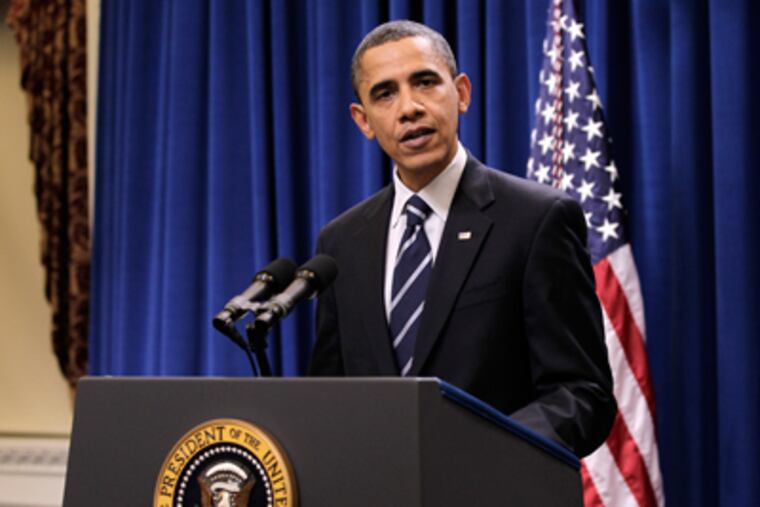Inquirer Editorial: Not an easy choice
Democratic lawmakers are understandably grousing about President Obama's tax-cut deal with Republicans, but they should vote for it. Some Democrats, including Rep. Allyson Y. Schwartz (D., Pa.) and Sen. Frank Lautenberg (D., N.J.), are unhappy that the proposal is too generous to the wealthy. They're right. Families earning more than $250,000, or with estates valued at more than $10 million, don't need additional tax breaks in this era of out-of-control deficits.

Democratic lawmakers are understandably grousing about President Obama's tax-cut deal with Republicans, but they should vote for it.
Some Democrats, including Rep. Allyson Y. Schwartz (D., Pa.) and Sen. Frank Lautenberg (D., N.J.), are unhappy that the proposal is too generous to the wealthy. They're right. Families earning more than $250,000, or with estates valued at more than $10 million, don't need additional tax breaks in this era of out-of-control deficits.
Tax relief for the wealthiest taxpayers is a provision "we didn't want, and we don't like," White House press secretary Robert Gibbs said in an interview with the Inquirer Editorial Board.
But due to Republicans' principle of looking out for the rich, the alternative to this plan would be tax increases for everyone on Jan. 1. That would be worse.
Obama's calculation is the right one, under these circumstances. Increasing taxes on all wage earners in this weak economy would threaten the recovery. And a faltering economy would harm the middle class more than the top 2 percent of wage earners.
This agreement is a direct consequence of the tea-party-aided GOP victory on Nov. 2. With Republicans preparing to take over the House next month, Democrats would have to be hallucinating to think they could obtain a badly needed 13-month extension of unemployment benefits in the new year.
Some Democrats are objecting that Obama gave up more in this compromise than did Republicans. But when you look at the cost and the provisions, this agreement amounts to a second economic "stimulus" plan - an idea cherished by liberals and reviled by conservatives.
In addition to the unemployment insurance, the proposal grants a payroll-tax reduction of two percentage points on income under $106,800. For a family of four with income of $75,000, that means an extra $1,500 in their pockets next year.
The overall cost to the government would be $900 billion over two years. The much-derided stimulus act of 2009 cost $787 billion, although it contained a wide variety of infrastructure projects and other spending not included in the new proposal.
The administration contends this plan will have a neutral impact on deficits by the middle of the decade, because it will spur economic growth and enhance tax collections. It will boost the economy, but it's wishful thinking to expect this proposal won't add to deficits. That rationale is similar to the old Bush administration argument that tax cuts "pay for themselves." It just ain't so.
Breaks for the wealthy aside, this deal is loaded with provisions to boost the economy. The extra unemployment aid and payroll-tax cuts will spur consumer spending next year. It extends the $1,000 child tax credit, and the earned income tax credit for families with three or more children.
Allowing businesses to expense all their investments in 2011, and extending research-and-development tax credits, will provide industry with incentives to hire more employees. Business expansion has been too slow in this recovery, as evidenced by last month's rise in the unemployment rate to 9.8 percent.
Obama is right; this deal is far from perfect. It adds too much to the deficit for the benefit of citizens who are in better position to make it without the help. But given the looming state of affairs in Washington, it's a good way forward.